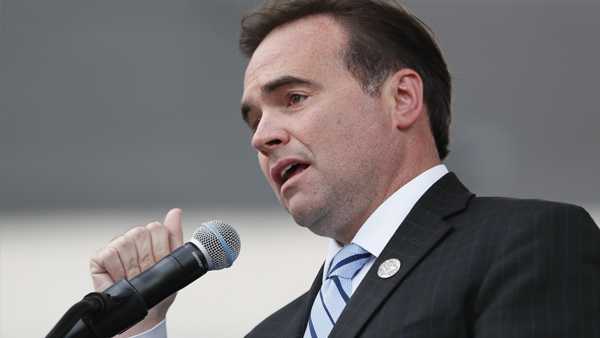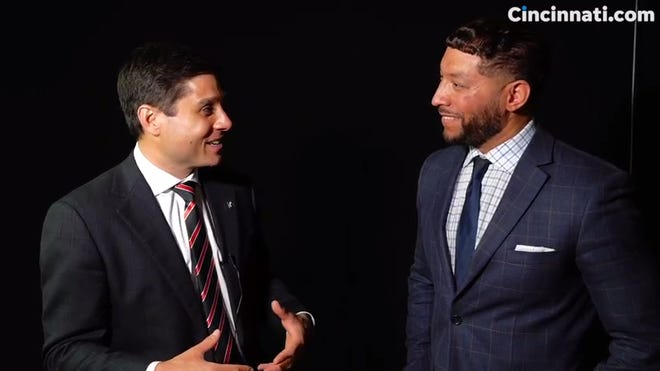

Cincinnati Mayor John Cranley made it official Tuesday, throwing hit hat in the ring for Ohio governor.Cranley released a video Tuesday morning, announcing his campaign.The focus of his campaign video was to "lead Ohio's comeback," creating jobs, legalizing marijuana and to pull money from energy companies to give to Ohio families to raise middle class."There's no question that being mayor over the last year during COVID and George Floyd were two of the most difficult professional challenges that we and as a city had to go through," Cranley said when asked about the tougher path candidates face when they come from a mayors office instead of another statewide office.Cranley joins Dayton Mayor Nan Whaley who is also running as a Democrat in the governor's race.Current Ohio Governor Mike DeWine is expected to announce his run for a second term as well. Cranley, 47, had been exploring a bid for the Democratic nomination for months and had raised more than $1.3 million for the effort as of July. Whaley reported raising more than $1.6 million. First elected mayor in 2013, Cranley is term-limited from running again this year. He points to his record as chief executive of a major city that's growing while others languish to show his capability to lead the state. “Ohio needs a comeback and deserves a governor who has led a comeback,” Cranley told The Associated Press in an interview. “It's not going to be easy to take a state like Ohio, which like so many in the Midwest has been in decline, and to have it come back again, but that's what we're going to do.”He said the GOP-controlled state Legislature has been tainted by corruption and puts the interests of big corporations over workers. He said he will make “jobs, jobs, and more jobs” his priority.Cranley’s economic plan calls for creating 30,000 new $60,000-a-year jobs annually in such areas as advanced manufacturing and renewable energy, and to improve Ohio roads, water systems and broadband networks.He proposes using tax revenue from legalizing recreational marijuana, now legal in neighboring Michigan and 17 other states, to pay for his programs. He also would reconfigure Ohio's privatized job creation office, JobsOhio. He also proposes offering Ohio homeowners $500 dividends paid for from energy company profits.As mayor, Cranley, who twice lost congressional races against Republican U.S. Rep. Steve Chabot of Cincinnati, aggressively pursued a new soccer stadium project that helped the city land a Major League Soccer franchise and helped Cincinnati police acquire a cutting-edge ShotSpotter gunshot detection system.His 2018 feud with a city manager who accused Cranley of overstepping his authority to undermine the city manager's role drew criticism from some fellow Democrats. The city manager eventually resigned with a severance agreement.Although Cranley, a Roman Catholic, personally opposes abortion, he doesn't think government should pass restrictions on the procedure that spark expensive, often unsuccessful, legal battles because “it's just not a good use of scarce resources.”“I'm pro-choice. I've struggled as a matter of faith,” said Cranley, who supports same-sex marriage.He and Whaley, also first elected mayor in 2013, consider each other friends and are in communication most weeks.“She is a close friend and I think she's done a lot of good things for Dayton," Cranley said. He said, with both running, "that means we're going to end up with a good candidate for governor.”Whaley unveiled her own jobs plan on Monday, just steps from Cranley’s office in Cincinnati. It calls for a $15 minimum wage and, like Cranley’s, investments in renewable energy. She also proposes directing state money and assistance to those businesses that pay a fair wage and kickstarting a ReInvent Ohio initiative for entrepreneurs.Asked whether the party should be trying for a diverse field next year, Cranley, who is white, replied: “I trust the Democratic primary voters to pick the best candidate to win the general election." He said he has been committed to diversity across city departments and within his own staff as mayor and would continue that trend as governor. Cranley, a Harvard-educated lawyer, and his wife, Dena, have a son.
Cincinnati Mayor John Cranley made it official Tuesday, throwing hit hat in the ring for Ohio governor.
Cranley released a video Tuesday morning, announcing his campaign.
The focus of his campaign video was to "lead Ohio's comeback," creating jobs, legalizing marijuana and to pull money from energy companies to give to Ohio families to raise middle class.
"There's no question that being mayor over the last year during COVID and George Floyd were two of the most difficult professional challenges that we and as a city had to go through," Cranley said when asked about the tougher path candidates face when they come from a mayors office instead of another statewide office.
Cranley joins Dayton Mayor Nan Whaley who is also running as a Democrat in the governor's race.
Current Ohio Governor Mike DeWine is expected to announce his run for a second term as well.
Cranley, 47, had been exploring a bid for the Democratic nomination for months and had raised more than $1.3 million for the effort as of July. Whaley reported raising more than $1.6 million.
First elected mayor in 2013, Cranley is term-limited from running again this year. He points to his record as chief executive of a major city that's growing while others languish to show his capability to lead the state.
“Ohio needs a comeback and deserves a governor who has led a comeback,” Cranley told The Associated Press in an interview. “It's not going to be easy to take a state like Ohio, which like so many in the Midwest has been in decline, and to have it come back again, but that's what we're going to do.”
He said the GOP-controlled state Legislature has been tainted by corruption and puts the interests of big corporations over workers. He said he will make “jobs, jobs, and more jobs” his priority.
Cranley’s economic plan calls for creating 30,000 new $60,000-a-year jobs annually in such areas as advanced manufacturing and renewable energy, and to improve Ohio roads, water systems and broadband networks.
He proposes using tax revenue from legalizing recreational marijuana, now legal in neighboring Michigan and 17 other states, to pay for his programs. He also would reconfigure Ohio's privatized job creation office, JobsOhio. He also proposes offering Ohio homeowners $500 dividends paid for from energy company profits.
As mayor, Cranley, who twice lost congressional races against Republican U.S. Rep. Steve Chabot of Cincinnati, aggressively pursued a new soccer stadium project that helped the city land a Major League Soccer franchise and helped Cincinnati police acquire a cutting-edge ShotSpotter gunshot detection system.
His 2018 feud with a city manager who accused Cranley of overstepping his authority to undermine the city manager's role drew criticism from some fellow Democrats. The city manager eventually resigned with a severance agreement.
Although Cranley, a Roman Catholic, personally opposes abortion, he doesn't think government should pass restrictions on the procedure that spark expensive, often unsuccessful, legal battles because “it's just not a good use of scarce resources.”
“I'm pro-choice. I've struggled as a matter of faith,” said Cranley, who supports same-sex marriage.
He and Whaley, also first elected mayor in 2013, consider each other friends and are in communication most weeks.
“She is a close friend and I think she's done a lot of good things for Dayton," Cranley said. He said, with both running, "that means we're going to end up with a good candidate for governor.”
Whaley unveiled her own jobs plan on Monday, just steps from Cranley’s office in Cincinnati. It calls for a $15 minimum wage and, like Cranley’s, investments in renewable energy. She also proposes directing state money and assistance to those businesses that pay a fair wage and kickstarting a ReInvent Ohio initiative for entrepreneurs.
Asked whether the party should be trying for a diverse field next year, Cranley, who is white, replied: “I trust the Democratic primary voters to pick the best candidate to win the general election." He said he has been committed to diversity across city departments and within his own staff as mayor and would continue that trend as governor.
Cranley, a Harvard-educated lawyer, and his wife, Dena, have a son.
Source link








